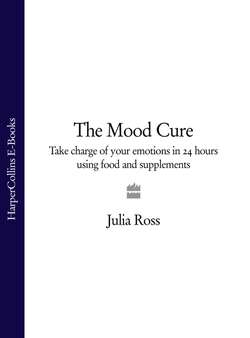Читать книгу The Mood Cure: Take Charge of Your Emotions in 24 Hours Using Food and Supplements - Julia Ross - Страница 16
WHY ARE YOUR MOOD ENGINES RUNNING ON EMPTY?
ОглавлениеDid You Inherit False Moods? Some of us tolerate the same adverse circumstances with much more serenity than others. My mother endured fifty years of marital stress, polio, cancer, heart disease, gallbladder disease, thyroid disease, and more with relish, grit, high comedy, courage, and selflessness. She was rarely depressed, irritable, or fearful. What was her secret? She had two—she’d inherited her own mother’s nicely balanced brain chemistry, and she always ate lots of the protein that maintained it.
Did you inherit good-mood genes? Many of us didn’t. Over the years, numerous clients have brought in parents, siblings, and children with false mood symptoms very similar to their own. A brief tune-up with amino acids and a dietary “adjustment” was often all that was required to set them right. These experiences taught me how often false moods run in families.
Did you think that your father was hard to be around on purpose or that your mother cried at any upset because she was so weak? These are the kinds of questions that I have learned to ask when exploring the types of negative moods that run in families. My clients have often found the answers to be unexpectedly liberating: Although Anna hated to compare her irritability with her father’s rages, when she realized that they shared a common brain chemistry deficiency, she ended up having new compassion for him and less of a hurtful sense that his abusiveness had been personal to her.
We all know families in which everyone is laid-back and others where no one can slow down; outgoing, cheery families and shy, quiet families; worried, perfectionistic, families and sloppy, low-energy families. Ask yourself as you go through this book, “Do my family members share any of my mood traits?” “Are we the same false mood type?” But you won’t need to worry about being a stick-in-the-mood. Although we used to think that genetic traits were intractable, when it comes to moods, even genetic programming can be reprogrammed remarkably easily by amino acids and other nutrients.
Is It Your Diet? Regardless of your genes, but especially if your mood-programing genes are inefficient, good nutrition is essential. It’s no coincidence that our grandparents’ generation had a more cheerful disposition than ours, although they certainly had their share of wars, depressions, diseases, and other hardships to deal with. The fact is that their diets were better. They were lucky enough to grow up before the junk food invasion and before low-calorie dieting had become a way of life. They ate “three square-meals” a day, including plenty of protein-rich foods like beef, chicken, fish, eggs, and cheese. Why are these particular foods so important? Because our four neurotransmitters can be made only out of the amino acids found in high-protein foods.
But protein is not all we need. We also need a good supply of vitamins and minerals to make this magic happen. They’re found in fresh fruits and vegetables, which your grandparents ate in abundance but which are lacking in the standard American and British diet.
And there’s something else that you may be shocked to learn. If we don’t eat enough of the right kinds of fats, we will not be able to utilize these natural mood-boosting fuels. Our grandparents ate gobs of the fats we’re no longer eating, like butter, and they had much less heart disease, cancer, and depression than we have. (More on this intriguing story in chapter 8.)
Then there’s the junk food factor. Commercial food processing strips food of the vital nutrients needed to make and operate your brain’s neurotransmitters. These bad-mood foods—including white bread and pasta, sugar-laden cereals and snacks, fried and hydrogenated fats, caffeine, and even the artificial sweeteners in diet soda—can actually interfere with your brain’s efforts to create good moods. You can’t pour sugar or any of these other stressful substances into your mood tanks and expect a smooth emotional ride.
Is It Your Lifestyle? Our modern lifestyle must share some of the blame for our epidemic of mood imbalance. Too much stress—particularly of the unique twenty-first-century variety—can deplete the brain of its “feel good” neurotransmitters, literally wearing it out. A good night’s sleep, adequate relaxation, and appropriate “down time” are critical to restoring optimal levels of good-mood chemicals, but these simple restorative remedies are getting lost in our “go till you drop” culture.
Is It Your Hormones? At our clinic, we’ve continued to learn new ways to improve false moods as we’ve bumped into new mood problems that have stumped us. Our biggest lessons, beyond how to fuel the brain’s four emotion-generating neurotransmitters, have been the lessons we’ve learned about hormones. Whether it’s the two thyroid hormones, the thirty-plus adrenal hormones, or the three sex hormones—estrogen, testosterone, and progesterone—their effects on your mood can be powerful. Without enough of all these hormones operating in concert, the neurotransmitters can be stymied. Liberating your brain’s emotional chemistry may require you to launch into a hormone-balancing campaign to eliminate whatever may be holding up the mood show. But don’t be intimidated; I’ll show you how.
